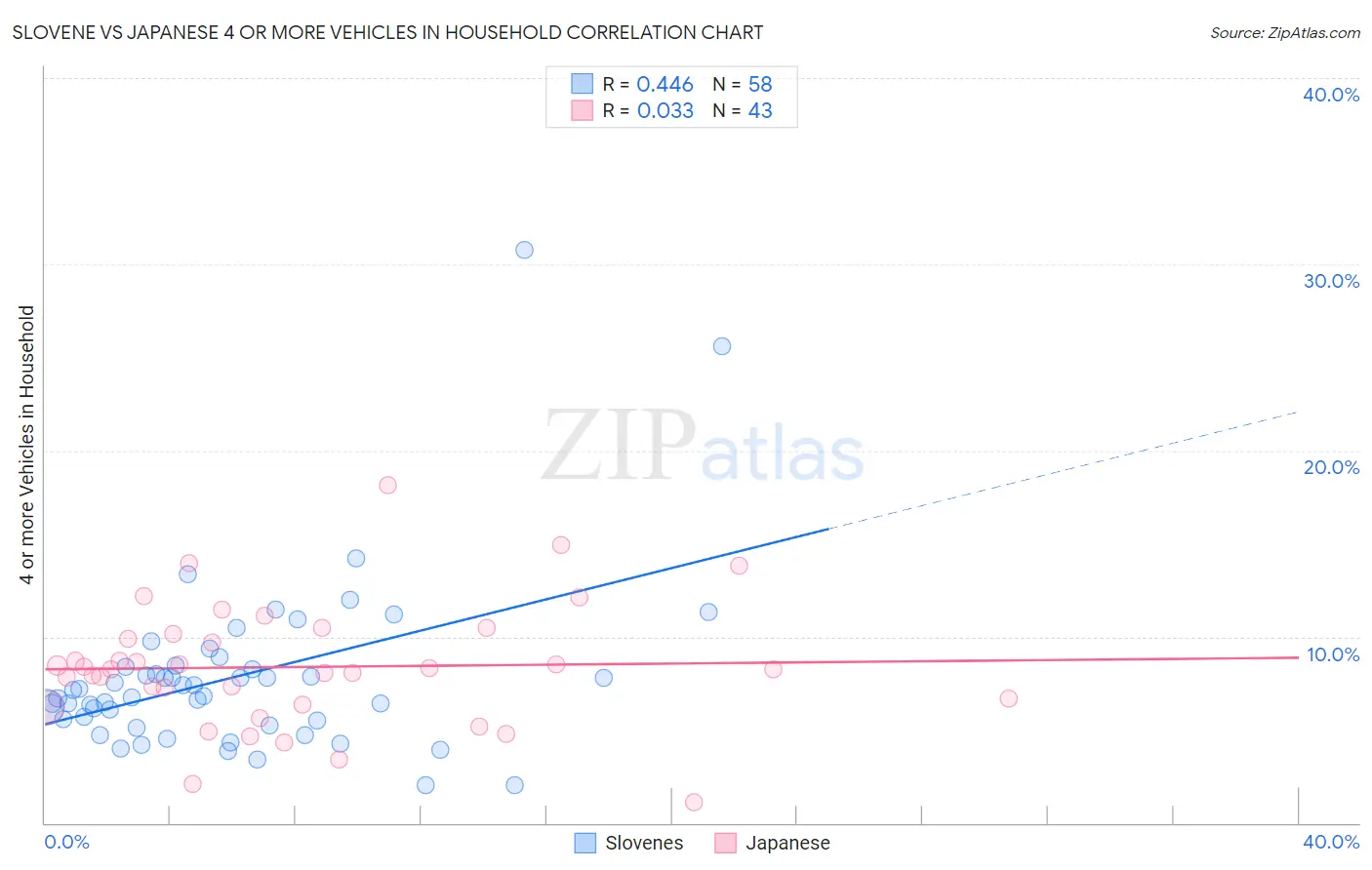Slovene vs Japanese 4 or more Vehicles in Household
COMPARE
Slovene
Japanese
4 or more Vehicles in Household
4 or more Vehicles in Household Comparison
Slovenes
Japanese
6.3%
4 OR MORE VEHICLES IN HOUSEHOLD
51.1/ 100
METRIC RATING
173rd/ 347
METRIC RANK
7.7%
4 OR MORE VEHICLES IN HOUSEHOLD
100.0/ 100
METRIC RATING
52nd/ 347
METRIC RANK
Slovene vs Japanese 4 or more Vehicles in Household Correlation Chart
The statistical analysis conducted on geographies consisting of 260,645,072 people shows a moderate positive correlation between the proportion of Slovenes and percentage of households with 4 or more vehicles available in the United States with a correlation coefficient (R) of 0.446 and weighted average of 6.3%. Similarly, the statistical analysis conducted on geographies consisting of 248,680,016 people shows no correlation between the proportion of Japanese and percentage of households with 4 or more vehicles available in the United States with a correlation coefficient (R) of 0.033 and weighted average of 7.7%, a difference of 21.5%.

4 or more Vehicles in Household Correlation Summary
| Measurement | Slovene | Japanese |
| Minimum | 2.0% | 1.1% |
| Maximum | 30.8% | 18.1% |
| Range | 28.8% | 17.0% |
| Mean | 7.8% | 8.4% |
| Median | 7.0% | 8.3% |
| Interquartile 25% (IQ1) | 5.5% | 6.3% |
| Interquartile 75% (IQ3) | 8.4% | 10.1% |
| Interquartile Range (IQR) | 2.9% | 3.8% |
| Standard Deviation (Sample) | 4.7% | 3.3% |
| Standard Deviation (Population) | 4.6% | 3.3% |
Similar Demographics by 4 or more Vehicles in Household
Demographics Similar to Slovenes by 4 or more Vehicles in Household
In terms of 4 or more vehicles in household, the demographic groups most similar to Slovenes are Immigrants from Lebanon (6.3%, a difference of 0.060%), Immigrants from India (6.3%, a difference of 0.080%), Lithuanian (6.3%, a difference of 0.12%), Immigrants from Syria (6.3%, a difference of 0.16%), and Immigrants from Western Europe (6.3%, a difference of 0.24%).
| Demographics | Rating | Rank | 4 or more Vehicles in Household |
| Immigrants | Denmark | 57.8 /100 | #166 | Average 6.4% |
| Poles | 56.9 /100 | #167 | Average 6.4% |
| Lebanese | 55.8 /100 | #168 | Average 6.4% |
| Estonians | 55.1 /100 | #169 | Average 6.4% |
| Immigrants | Syria | 52.8 /100 | #170 | Average 6.3% |
| Immigrants | India | 51.9 /100 | #171 | Average 6.3% |
| Immigrants | Lebanon | 51.7 /100 | #172 | Average 6.3% |
| Slovenes | 51.1 /100 | #173 | Average 6.3% |
| Lithuanians | 50.0 /100 | #174 | Average 6.3% |
| Immigrants | Western Europe | 48.8 /100 | #175 | Average 6.3% |
| Ukrainians | 47.6 /100 | #176 | Average 6.3% |
| Slovaks | 46.9 /100 | #177 | Average 6.3% |
| Belizeans | 44.5 /100 | #178 | Average 6.3% |
| Immigrants | Japan | 43.1 /100 | #179 | Average 6.3% |
| Syrians | 42.0 /100 | #180 | Average 6.3% |
Demographics Similar to Japanese by 4 or more Vehicles in Household
In terms of 4 or more vehicles in household, the demographic groups most similar to Japanese are Immigrants from Laos (7.7%, a difference of 0.12%), Malaysian (7.7%, a difference of 0.38%), Dutch (7.7%, a difference of 0.46%), Immigrants from El Salvador (7.7%, a difference of 0.47%), and Cherokee (7.7%, a difference of 0.63%).
| Demographics | Rating | Rank | 4 or more Vehicles in Household |
| Choctaw | 100.0 /100 | #45 | Exceptional 7.8% |
| Crow | 100.0 /100 | #46 | Exceptional 7.8% |
| Osage | 100.0 /100 | #47 | Exceptional 7.8% |
| Swiss | 100.0 /100 | #48 | Exceptional 7.8% |
| Cherokee | 100.0 /100 | #49 | Exceptional 7.7% |
| Immigrants | El Salvador | 100.0 /100 | #50 | Exceptional 7.7% |
| Immigrants | Laos | 100.0 /100 | #51 | Exceptional 7.7% |
| Japanese | 100.0 /100 | #52 | Exceptional 7.7% |
| Malaysians | 100.0 /100 | #53 | Exceptional 7.7% |
| Dutch | 100.0 /100 | #54 | Exceptional 7.7% |
| Immigrants | Oceania | 100.0 /100 | #55 | Exceptional 7.6% |
| English | 100.0 /100 | #56 | Exceptional 7.6% |
| Pennsylvania Germans | 100.0 /100 | #57 | Exceptional 7.6% |
| Swedes | 100.0 /100 | #58 | Exceptional 7.6% |
| Hispanics or Latinos | 100.0 /100 | #59 | Exceptional 7.6% |